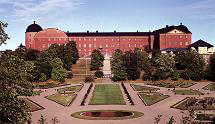Sprecher
Herr
Joseph T K McKenna
(University of Liverpool)
Beschreibung
The principal aim of the ALPHA experiment at CERN is to trap cold atomic antihydrogen, study its properties, and, ultimately, perform precision comparison between hydrogen and antihydrogen atomic spectra. Recently, several important milestones have been achieved, including long confinement times of antihydrogen atoms, the first spectroscopic measurements of the antihydrogen atoms and first application of a new technique to measure the gravitational mass of antihydrogen.
The main experimental tool for the antihydrogen detection in the experiment is the ALPHA silicon vertex detector. The detector consists of three concentric barrels of 144 double sided silicon sensors and provides information on the time evolution of antiproton plasmas and individual annihilation events.
The characteristics of the detector will be presented along with an application of the precise reconstruction of the annihilation vertex and its importance in the anti-matter gravity search.
Autor
Herr
Joseph T K McKenna
(University of Liverpool)
Co-Autoren
Herr
David Wells
(University of Liverpool)
Frau
Janet Sampson
(University of Liverpool)
Herr
Jim Thornhill
(University of Liverpool)
Prof.
Paul Nolan
(University of Liverpool)
Dr.
Petteri Pusa
(University of Liverpool)
the ALPHA collaboration
(CERN)

